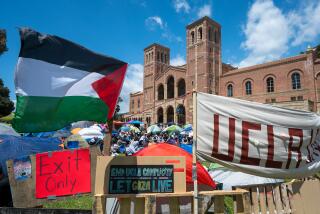Telemundo Wins Greater Access to Festival
- Share via
A U.S. District Court judge ruled Wednesday that the city of Los Angeles violated the law when it gave Univision Communications Inc. special access to a Mexican Independence celebration from the steps of City Hall.
In a 15-page ruling, Judge Audrey B. Collins ordered the city to give local stations owned by rival TV broadcaster Telemundo the same access to Monday’s El Grito event. Univision owns the Los Angeles station KMEX-TV Channel 34.
“Defendants have not presented one reason, compelling or otherwise, why they initially decided that KMEX’s cameras should be granted access to the official ceremony while Telemundo should be required to use” a video feed from KMEX, Collins wrote in her ruling. “The city’s restrictions on Telemundo’s access ... are unreasonable.”
Univision, the nation’s dominant Spanish-language network, has been helping to produce the event for the last 20 years, scripting the ceremonies and providing the talent. The city of Los Angeles also contributes some funds.
“Telemundo is very pleased with the court’s decision to grant our request for equal press access to the El Grito Mexican Independence Celebration, a taxpayer-sponsored public event,” said spokeswoman Diana Sousa.
Univision executives had no comment. A spokesman for the city attorney would say only that his office believes in equal access.
The celebration of El Grito, which means “the cry” in Spanish and refers to the day in 1810 when Father Miguel Hidalgo y Costilla rang his church bell and rallied peasants to rebellion against Spain, is expected to attract 50,000 people, along with countless more who will watch on television.
Telemundo, which is in a fierce contest with Univision for viewers in Los Angeles, decided this year that it wanted to send cameras onto the stage for the public portion of the event, in which Mexican Consul General Martha I. Lara will ring a bell as Mayor James K. Hahn and other officials look on.
The network, owned by General Electric Co. unit NBC, first sought access to the event in May, with phone calls to City Council President Alex Padilla. Padilla’s office did not return most of those calls, according to court records.
Finally, on Aug. 1, according to Telemundo’s complaint, Padilla told the network that “at this late date” it was impossible to change the plans and that Telemundo would be confined to a separate area along with cameras from other TV networks.
A few weeks later, Padilla wrote another letter to Telemundo, informing it that Univision would be willing to provide live video and audio feeds and urging Telemundo to contact Univision to work it out.
In response, Telemundo went to court to get an injunction. In the complaint, it charged that the city was depriving Telemundo of its 1st Amendment rights. The complaint also said that Univision had secured the broadcast rights without a competitive bidding process and that Univision’s chief executive, A. Jerrold Perenchio, had made contributions to Hahn and Padilla.
According to campaign finance records, Perenchio was one of the biggest donors to the mayor’s anti-secession campaign last year, contributing $318,000 in cash and television air time. In addition, Perenchio has contributed $1,500 to Padilla’s campaigns and $2,000 to Hahn’s. He and relatives gave $2,000 to City Atty. Rocky Delgadillo’s 2001 election campaign.
Officials said those contributions played no role in Univision being granted the broadcast rights. Padilla’s office also said that the reason it did not call Telemundo officials back promptly was because it was seeking advice from attorneys over potential legal issues.
*
Times staff writer Patrick McGreevy contributed to this report.
More to Read
The biggest entertainment stories
Get our big stories about Hollywood, film, television, music, arts, culture and more right in your inbox as soon as they publish.
You may occasionally receive promotional content from the Los Angeles Times.










